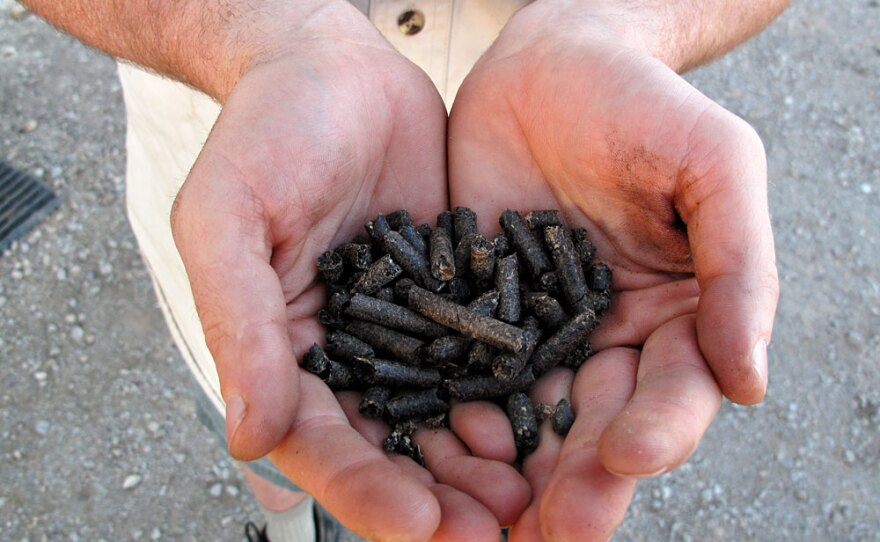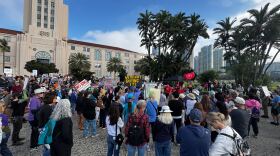When farmers in the town of Dove Creek, Colo., started planting sunflowers a few years ago, many of them were motivated by the promise of a decent income — not energy independence. But an activist-turned-entrepreneur named Jeff Berman had floated a proposal with a green hook: He told farmers if they grew sunflowers, he'd give them a renewable fuel source.
"Well, when we first came in we were going to produce biodiesel, from local, sustainably grown oil seeds, and allow the farmers to use that fuel, to grow the wheat and the beans that they also grow here," says Berman, chief executive officer of San Juan Bioenergy.
His part of the bargain was to build a facility in Dove Creek that could turn sunflower seeds into biodiesel. To do that, farmers would have to start producing sunflowers. Lots of them.
"It was very attractive to think that we could raise our tractor fuel, sure," says Dan Warren, a third-generation farmer in Dove Creek, who remembers those early meetings with Jeff Berman. "With pencil and paper you could see that there was more money involved, per acre, in the sunflowers than there was in the beans and the wheat on a normal year."
But farmers are a conservative lot. Richard Knuckles says he was skeptical.
"The way they painted the picture everything was just going to go smooth as molasses," he says. "Everybody was going to raise sunflowers and get rich."
A Relief From Unemployment
It's likely that any number of development projects — green or not --would have received enthusiasm in Dove Creek. Unemployment in the surrounding county leads the state of Colorado at around 14 percent.
Follow the highway that runs through town, and you'll see empty storefronts tucked in between the clusters of grain silos and supply stores.
Follow the highway out of town, and you'll find sunflowers flourishing in the high desert.
Grant Allen, 22, grew up here farming pinto beans and wheat with his father. Five years ago, he raised one of the first small sunflower pilot plots in the area. Now he's scaled it up.
Pointing to one of his 300-acre fields where the red earth is as fine and dry as talcum powder, he says he planted more than 2.5 million seeds there.
The sunflowers are now chest high. Bristly, green leaves and stalks scrape at our clothing, as we cut across the planted rows, into a massive crowd of bright yellow faces — blooms the size of dinner plates.
"I love growing 'em," Allen says. "This right here — whenever they're bloomed out — this is what I farm for here. I mean look at this."
Still, as much he loves sunflowers, Allen says it was the processing facility that had made them a viable crop.
"We farmed sunflowers on the pure hope that they were going to get their doors open, and [the processing facility was] going to start producing," he says. "That's what kept us going, you know?"
Shifting From Biodiesel To Sunflower Oil
By 2008, thousands of acres around Dove Creek were filled with sunflowers. Local grain silos filled up with the sunflower seeds that San Juan Bioenergy had purchased from farmers. Berman says he had raised $5 million through investments and loans. And a plant was under construction that would extract oil and convert it to biodiesel. But the biodiesel market was beginning to crash. And by the end of the year, federal subsidies for biofuels dried up.
"To survive, we had to make some changes," Berman says. "If we had insisted on building our biodiesel plant, then we would not be here."
Berman's key to survival was to focus on the part of the operation that was still viable: producing food-grade sunflower oil.
This shift in gears may not have been an easy transition for Berman, who was looking to start a green revolution with his business. But the company has managed to stay alive and hang on to its renewable vision.
Green Innovations
Thus far, the facility's main green innovation is in the way that waste products — in this case sunflower hulls and pieces of plant material — are transformed into fuel. Machines grind up this biomass and press it into little fuel pellets, which look like rabbit food. The pellets are then fed into a special gasifier chamber.

Berman says 95 percent of the biomass turns into a gas, which is then routed to the company's generator. "And so you can burn natural gas, or synthetic gas in our case, in a generator to produce your own power," he says.
Berman estimates the system will eventually produce a third of the electricity and all of the heat needed to run the plant. But the workers are still fine-tuning the process. Meanwhile, Berman is continuing to dream.
"We plan, in our next phase of development, to build wind and solar," he says. That would create what might be the first "always on, hybrid renewable" plant anywhere in the United States — and perhaps the world.
But that next phase is no sure thing at this point. To complete the processing plant and finish paying farmers for last year's crop, Berman has been shipping sunflower seeds to the Midwest at a loss. San Juan Bioenergy has produced just 15 tankers of oil since January. Farmers, like Allen, have begun to worry.
"Sunflowers could bring us farmers down, just as much as it could bring us up right now," Allen says.
Berman's vision has motivated a small community to step out into uncertain territory. It's a risky place to be. But in many ways, Dove Creek is no worse off that it was five years ago when Berman first came to town. And if it turns out that San Juan Bioenergy does crack the code on sunflower power, it'll be Dove Creek waiting for the world to catch up.
Copyright 2022 NPR. To see more, visit https://www.npr.org. 9(MDAzMjM2NDYzMDEyMzc1Njk5NjAxNzY3OQ001))






